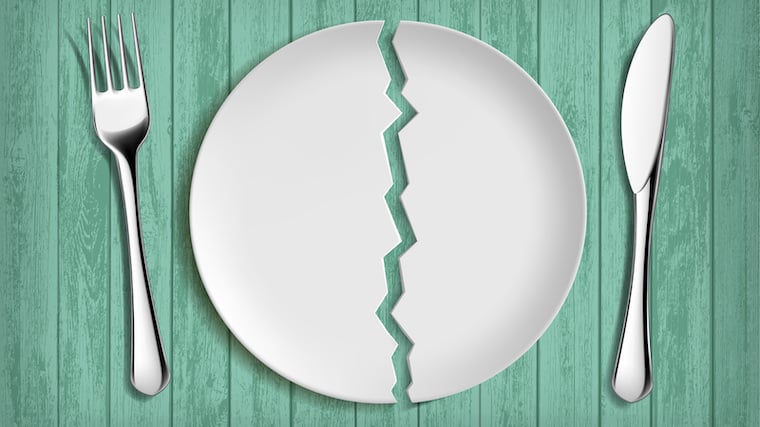There are many diets peddled to gym-goers, athletes, those trying to gain weight, lose weight, maintain weight, and everything in between. Whether it’s keto, paleo, cheat meals, intermittent fasting, or something else, not every diet is effective, and the ones that are, more often than not, aren’t necessarily right for every individual.
One of those diets tossed into the ring of ways to drop weight is the crash diet — short-term calorie restrictions. Dr. Layne Norton published a video on his YouTube channel on Aug. 30, 2023, wherein he breaks down some of the latest research on how crash diets affect hypertrophy and performance. Check it out below:
[Related: Nutritionist Vs. Dietitian: What Are They and Which is Best For You?]
The research referenced by Layne is a June 2023 study in The Journal of Physiology. It was a tightly controlled, 10-day human trial with female participants that measured many markers, including resting energy expenditure, blood and urine samples, and muscle biopsies. (1)
The 30 subjects of the study were paired based on their training history, and the experimental period began when all the participants were within five days of the same menstrual cycle.

Editor’s note: The content on BarBend is meant to be informative in nature, but it should not be taken as medical advice. The opinions and articles on this site are not intended for use as diagnosis, prevention, and/or treatment of health problems. Talking to your doctor before beginning a new fitness, nutritional, and/or supplement routine is always a good idea.
Each participant received upwards of 2,400 calories per day to fuel the intensive upper and lower body resistance training and intense cardio sessions. The protein intake was 2.2 grams per kilogram of lean mass — this offsets the participants’ variations in body fat percentage.
Does Low Energy Intake Impair Anabolism and Performance?
To determine the effects of a crash diet on anabolism and performance, the control group maintained the initial diet of about 2,400 calories per day, while the intervention group had their carbs and fat halved to bring calories down to sub-1,400 per day.
The control group didn’t incur any alterations in body weight but did have a slight recomposition as they gained some lean mass and dropped some body fat. The intervention group, on the other hand, lost both body fat and lean mass.

One of the most notable findings was that the intervention group’s rate of muscle protein synthesis during their crash diets was significantly lower than the control group despite maintaining similar protein intake.
Calories are protein sparing and are good for protein synthesis.
Norton stated that building muscle is more difficult when in a caloric deficit. Consuming fewer calories makes it more challenging to signal the body to build muscle via protein synthesis. The metabolism of the intervention group slowed by approximately 65 calories per day after 10 days.
Takeaways
Norton’s takeaways from this study are that for those who aim to build muscle, the evidence is strong enough that caloric maintenance or caloric surplus are the optimal options.
Being in a deficit will impair the ability to accrue lean mass.
Intense training is effective for maintaining lean mass. Before, Norton presumed that those in the intervention group would lose more lean mass than they actually did in such a steep caloric deficit. Of the weight lost, only a quarter of it was lean mass.

Training intensity was remarked as a significant factor for sufficient body recomposition. Norton suggested that most gym-goers who fear overtraining are more likely to be undertraining by not pushing their sets to near failure as much as they could.
If you want to build muscle, learn to tolerate discomfort.
The participants in the study scored, on average, five reps more when coached than they would have on their own. So if the goal is to build lean muscle mass, eat at calorie maintenance or surplus and train harder. The research suggests most don’t train as hard as they are capable of, and, as a result, gains are squandered.
Reference
-
Oxfeldt, M., Phillips, S. M., Andersen, O. E., Johansen, F. T., Bangshaab, M., Risikesan, J., McKendry, J., Melin, A. K., & Hansen, M. (2023). Low energy availability reduces myofibrillar and sarcoplasmic muscle protein synthesis in trained females. The Journal of physiology, 601(16), 3481–3497. https://doi.org/10.1113/JP284967
Featured image via Shutterstock/TrifonenkoIvan.
The post Does Crash Dieting Negatively Affect Body Composition and Muscle Gains? appeared first on BarBend.

